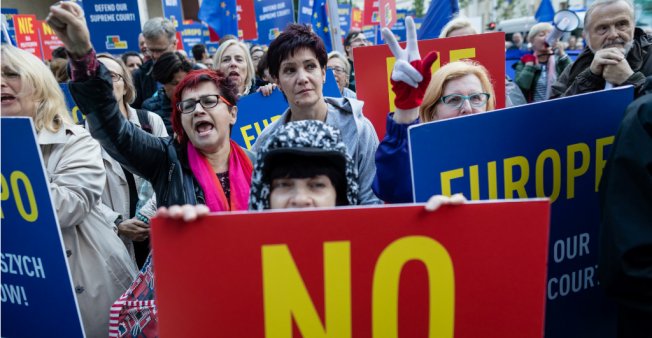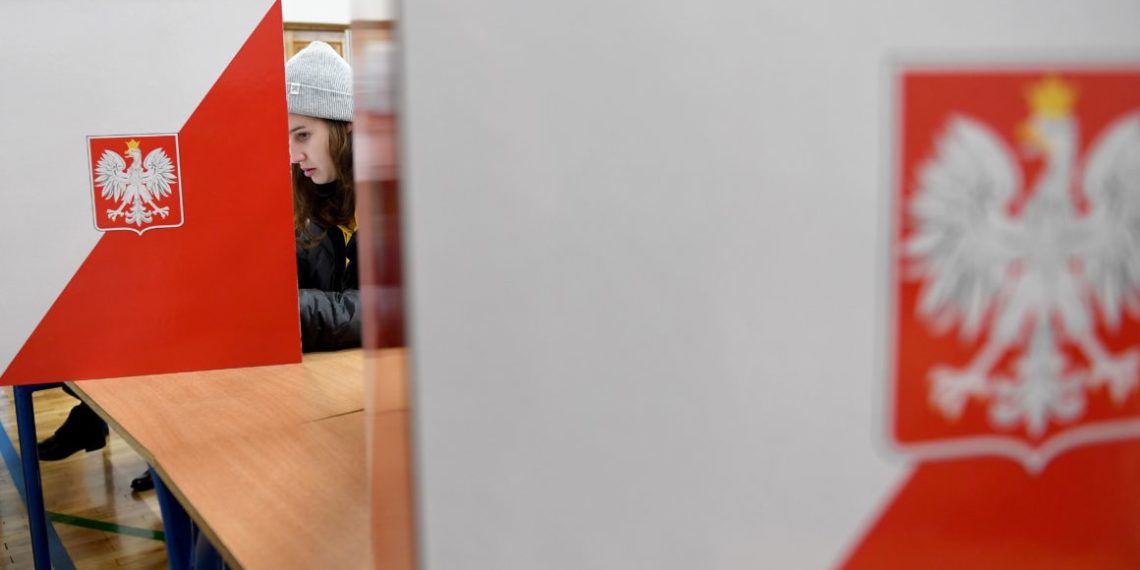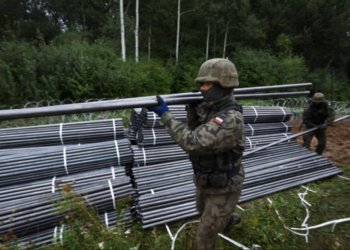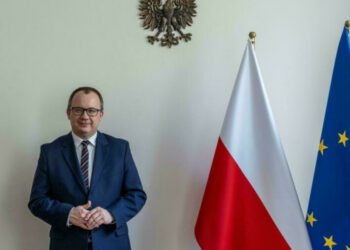As a historian, I am inclined to take the long view on political developments, and I usually cringe when people describe an upcoming election as a choice between the apocalypse and salvation. But this weekend’s Polish election deserves all the hyperbole we can muster.
In 2015, the far-right Law and Justice Party (Prawo i Sprawiedliwość, or PiS) of Jarosław Kaczyński managed to take power after winning 38 percent of the vote, thanks to the peculiarities of Polish election law and the fragmentation of the parties of the left. The new government quickly transformed the state-run media into a propaganda mouthpiece, purged the civil service, strengthened partisan political control over state-run businesses, and above all, eliminated the independence of the judiciary.
Kaczyński himself has recently re-iterated that this last point was always the most important because his broader goals could not be achieved if judges retained the power to block his measures. The courts, he said, were (and to a small extent remain) the “last barricade” that PiS must remove from its path.
PiS’ Popularity
Despite all this, it must be acknowledged that millions of Poles have seen their lives improve since 2015. Kaczyński’s disdain for intellectuals and experts has allowed him to ignore the economists who would urge frugality or austerity. Instead, he has taken advantage of a period of global economic growth to stimulate consumption and slightly reduce income inequality.
PiS has designed their social spending programs carefully, with generous social welfare targeted at specific communities, social groups, and institutions. Their so-called “500+” program of cash payouts for children rewards large families, their investments in coal win them support from an important segment of organized labor, and their campaign promises for ongoing social-transfer programs are precisely aimed at key constituencies.
Understandably, many Poles will cast their votes based on these accomplishments, and that’s the main reason why surveys suggest that PiS will increase their percentage of the vote from the high 30s to the low 40s.

But a review of PiS documents, particularly the unusually comprehensive party platform, makes it crystal clear that all these economic and social policies are a means to an end. In a revealing passage, the platform acknowledges that PiS’s first objective is the “repair of the state, beginning with the creation and strengthening of its historical, axiological, and pragmatic legitimacy, and ending with the repair of its structure.”
However, the authors conclude, these plans could not be carried out during the first term, “because of the need to achieve enduring social support, and, as follows, the stability of the government against constant attacks.” There was, in other words, “a tight bond between particular initiatives in various areas, including an obvious bond between the policies about the development and repair of the state on the one side, and an increase in the purchasing power of social groups not heretofore acknowledged by the authorities.”
‘Repairing’ Poland
What, then, would this fundamental “repair” of the state entail? The answer lies in PiS’ understanding of what has happened in Poland over the past 30 years. Back in 1989, most of the world thought that communism had been overthrown, but contrary to appearances, PiS tells us, “the elements of continuation decisively outweighed the elements of change.”
Above all, there was no relaxation of an alleged leftist cultural project to “expand liberal values” and “violate social norms.” The authors of the PiS platform claim that the “abandonment of loyalty to the Polish state by a considerable part of the elite is without a doubt a major characteristic of the system created after 1989.” This traitorous elite then employed a “massive system of manipulation” aimed at concealing their true aims, which involved things like the undermining of Polish patriotism and the “active realization in Poland of a German historical policy.”
In political terms, this anti-Polish conspiracy promoted a perverse understanding of the state as “essentially a collection of independent institutions” without the power to defend the nation with unity and determination. Those institutional divisions of authority made it nearly impossible for “democratic control mechanisms” to institute desired reforms, punish corrupt and disloyal opponents, and override the resistance of entrenched institutions of the local authority.
The only way to repair the damage inflicted by the treasonous communist and post-communist elites, the PiS program insists, is to ensure that those who truly represent the Polish nation pursue a coherent, determined, and above all unified policy. In addition to establishing control over the judiciary, the platform identifies a few other areas that will require concerted effort in the next term of PiS rule.
Local Governments and Education
First, local self-government threatens to place obstacles on PiS’ path because every city in the country with more than 100,000 people is controlled by the opposition. Therefore, the party platform outlines plans to strengthen the position of an office known as the “wojewoda.” This person represents the central government in each of Poland’s 16 provinces (województwa), serving as an unelected state or provincial governor.
In the past, this problematic office has had limited powers, but the plan for PiS’ second term entails making “the office of the wojewoda the key organ of government administration” on the local level, giving it “real supervisory authority” as the executive branch of government with a “significantly increased role.”
Parallel to this, the PiS program states that the authority of local school boards to manage education will be curtailed. There has long existed a figure known as the “curator of education,” appointed to each district by the wojewoda as a representative of the national Ministry of Education. This official will gain enhanced authority to manage local schools: “We will not allow the state to be deprived of the possibility of shaping educational policy,” promise the authors of the PiS platform, “and we will provide the necessary tools (financial and otherwise) to make this possible.”
Freedom of Media
Perhaps the most unsettling of PiS’s election promises, however, involves the media. Kaczyński long ago transformed the state-run broadcast services into propaganda mouthpieces, but Poland retains a robust independent media infrastructure. PiS has long discussed “re-Polonizing” the media by eliminating foreign ownership, but this is a battle that they cannot win: the largest opposition news channel is owned by the U.S.-based Discovery Network, and the combined opposition of the Americans and the E.U. would be too much even for PiS.
Poland's state media has been turned into the mouthpiece of Poland’s government, raising concerns about how fair the country’s elections on Sunday can be https://t.co/waFFCHXbfk
— New York Times World (@nytimesworld) October 11, 2019
Instead, the party platform proposes the creation of a new media ethics board that will function as a licensing body, akin to those that already exist for doctors and lawyers. Despite assurances that “this will not in any way limit the principle of openness in the journalistic profession,” we learn that the new board will allow authorities to “care for ethical and professional standards, carry out self-regulation, and assert responsibility for the process of educating future journalists.”
It is left unstated who will appoint the leadership of this media ethics board, but PiS has already created a judicial ethics board, with political appointees in charge, to purge the legal profession.
There is still a chance to prevent all this. If Kaczyński is denied a majority of parliamentary seats this Sunday – and it is going to be very close – Poles can begin the arduous task of re-assembling the safeguards of liberal democracy. The coming years would involve a lot of hard work and many difficult decisions, but repairs are still possible. If PiS gets another four years to advance to the next stage of its agenda, incomparably more damage will have been done.
Disclaimer: The views and opinions expressed here are those of the author and do not necessarily reflect the editorial position of The Globe Post.





















